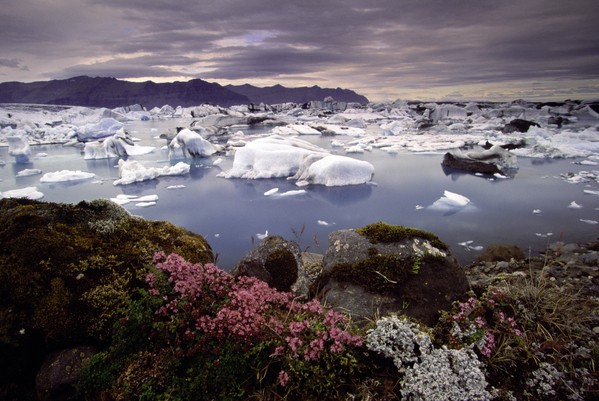(VOVworld) – There has been little indication of any future for the Kyoto Protocol at the ongoing UN conference on climate change in Qatar. The Kyoto Protocol, currently the only international agreement to reduce greenhouse gases, will expire at the end of this month. This does not make any surprise as since the conference opened last Monday, the public is wondered about its success that will bring a historical opportunity in making a basic change in the globe protection. VOV editor Hong Van comments…
 |
| Icebergs in Iceland. As global temperatures continue to increase, melting ice is predicted to be a major contributor to sea level rise. (© Art Wolfe/ www.artwolfe.com) |
The 18th UN Conference on climate change response is seeking a new legal framework for reducing green house gas emissions and increasing aid for climate change. But the first week of the meeting saw only disagreements among the 200 participants. Developed countries have hesitated to make a stronger commitment to cutting greenhouse gas emissions. The EU is determined to reduce greenhouse gases at least 20% by 2020 but, on contrast to the EU’s goodwill, Canada, Japan, and New Zealand say that they will withdraw from the protocol next year. The US, the world’s biggest economy, frankly declared that it will not sign any agreement on gas reduction unless China, India, Brazil, and South Africa do the same.
Nations also disagree about when the next protocol should expire. The EU and BASIC have proposed an eight-year term to match targets set for 2020. Others, especially small island countries, want a five-year term to force developed nations to make a greater effort to cut greenhouse gases.
There has been further disagreement about how to measure gas emissions, how to report and verify emissions, and the level of contributions from developed countries to developing countries to mitigate climate change.
According to the latest UN statistics, the concentration of carbon dioxide in the atmosphere has increased 20% since 2000. A World Bank study indicates that if countries worldwide don’t take quick action, the average global temperature will increase 4 degrees Celsius in this century, twice the previous UN estimate. The increase will be 6 degrees Celsius or even higher in the Mediterranean, North Africa, the Middle East, and many parts of the US. Humans will suffer worse natural catastrophes. The World Meteorological Organization reports that the amount of greenhouse gas released into the atmosphere reached a record high last year.
The Alliance of Small Island States said further delay in reaching an agreement could doom many of its members. Although the COP 18 will close by the end of this week, many observers say the meeting is likely to end with only an agreement in which all parties will show their awareness about the need to sign a new protocol to replace the Kyoto but few will do something.
Hong Van